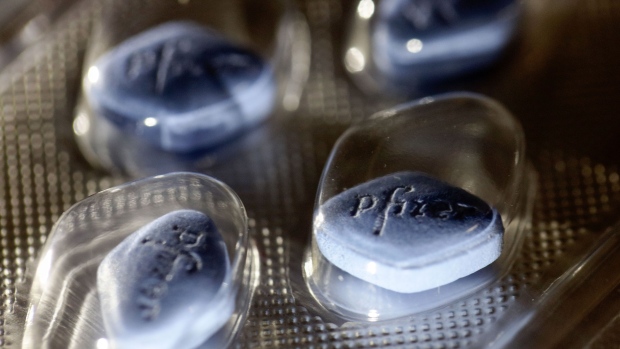Aug 20, 2020
Foreign Drug Giants Undercut by Up to 95% in China Bidding War
, Bloomberg News

(Bloomberg) -- Global drugmakers from Merck & Co. to Novartis AG lost another slice of their lucrative China business, as domestic competitors undercut them with bids more than 95% lower to supply treatments to public hospitals.The results of China’s latest round of drug procurement, a brutal price-cutting exercise, confirmed that foreign pharmaceuticals are being virtually shut out of supplying medicines that they originally developed years ago to local patients.
Eli Lilly & Co.’s therapy for treating schizophrenia was outbid as domestic competitor Qilu Pharmaceutical Co. offered an equivalent at less than one-tenth the price, Shanghai-based media outlet Jiemian reported. Pfizer Inc.’s Viagra was squeezed out by Qilu’s generic version that sells for about half a dollar, while the U.S. company’s rheumatoid arthritis therapy lost out to four domestic generics.
Global and domestic drug companies dispatched their representatives to Shanghai on Thursday to bid for contracts to supply a wide array of commonly used medicines that treat everything from infection and hypertension to diabetics and dementia. The process -- involving more than 56 medicines -- is the third of its kind after Beijing launched a pilot program at the end of 2018.
Ambitious Campaign
The Chinese government is on an ambitious campaign to cut spending on generic medications by tens of billions of dollars so that it can shift funds toward novel, top-of-the-line treatments for life-threatening diseases like cancer.
The process has erased the global companies’ profit margins in China for their established medications that are no longer under patent protection, cutting off what had been significant revenue streams. In a sign that foreign giants have accepted that they cannot compete any longer with generics in the world’s second biggest drug market, some bid prices above the cap set by authorities on Thursday, in effect disqualifying themselves.
“Foreign pharmaceutical firms are making a strategic retreat from some of their older drugs,” said Zhang Jialin, a health-care analyst at ICBC International Research Ltd. in Hong Kong. “They are pivoting for market shares on drugs not covered by the bulk purchase program to maintain profitability.”
Price Plunges
Prices for diabetes drug metaformin plunged more than 90%, according to Jiemian, as domestic drugmakers fought for the more than 6 billion yuan market.
A similar price plunge was seen on a drug for treating enlarged prostate or men’s hair loss, with a domestic drugmaker offering a treatment 93% below the price cap.
In the initial program covering 11 cities, companies promised to slash prices as much as 90%, resulting in nearly 6 billion yuan ($870 million) in savings for the country’s state medical insurance. The bidding has since expanded nationwide and covered more medicines, forcing global giants to adjust to the dramatic shift in a once lucrative market for their off-patent medications.
How China’s Drug-Buying Program Is Causing Pain: QuickTake
Some Western pharmaceutical companies such as AstraZeneca Plc and Bayer AG in the past have managed to secure contracts for their drugs, but only by slashing prices by as much as 80%.
©2020 Bloomberg L.P.